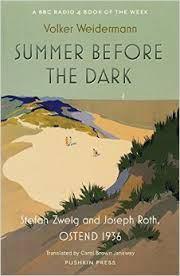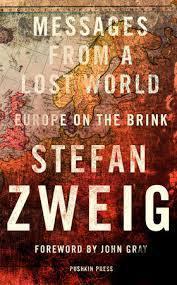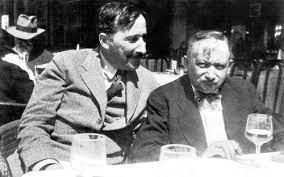Summer before the dark, by Volker Weidermann and translated by Carol Brown Laneway; Messages from a Lost World, by Stefan Zweig and translated by Will Stone
Pushkin Press have done marvels in restoring an entire generation of lost voices to contemporary English-language readers: Antal Szerb, Ernst Weiss, Arthur Schnitzler, Leo Perutz, Joseph Roth and of course their greatest rediscovery Stefan Zweig.
I say lost voices, but really these are voices which were deliberately silenced. It’s no coincidence that most of them are cut-off in the late 1930s to early 1940s. The Nazis sought to intimidate and destroy all art and culture that wasn’t in service of their own horrific goals. For a while they succeeded, and it’s a tragedy that so few of these writers survived to see how brief that success was and how total the Nazi’s ultimate defeat.
In his Summer Before the Dark, Volker Weidermann takes us to a moment of peace before the coming destruction: 1936 Ostend where a group of émigré writers briefly gathered. Pushkin have simultaneously published Messages from a Lost World, a collection of essays by Stefan Zweig written from the dawn of the first world war to the depths of the second.


I’m reviewing these together partly as Pushkin Press published them together and partly because they are such natural companion pieces. Both, as you’d expect from Pushkin, are physically lovely: well made hardbacks with high quality paper and well judged cover designs. They’d make the perfect gift for a melancholic relative…
Summer takes the reader to Ostend in 1936. It’s a rather Proustian middle-class Belgian seaside resort of the sort common before mass cheap airfare existed. The rise of the Nazis has already displaced a great many German language writers with Zweig one of the last to find himself unable to publish in his native tongue.
Over one summer Joseph Roth, Stefan Zweig, Irmgard Keun, Arthur Koestler and many more find themselves briefly together enjoying the cafes and the culture that have always formed the backdrop to their lives. It’s civilised Europe in miniature.
Weidermann skilfully evokes both time and place. It’s easy to picture the writers having passionate arguments about how best to intervene in Franco’s Spain (Koestler is despatched as a sort of amateur-spy) while crafting new manuscripts and falling into new relationships.
The book opens with a previous visit by Zweig to Ostend in 1914. Back then he couldn’t believe war would actually happen and delayed departure, incredulous at the idea that anyone would move beyond posturing to actual conflict. On the last train back he saw cannons being moved to the front – a physical rebuttal of his belief that common interest would outweigh nationalist folly.
In 1936 Roth is again striving for optimism, though it seems to be getting harder. Zweig at this point is a literary superstar. He’s rich and his books are hugely popular and widely translated. Ostend is a haven from his recent troubles in Germany, troubles which he’s been better insulated from to date than most:
Stefan Zweig in the summer of 1936. He looks at the sea through the large window and thinks with a mixture of pity, reticence and pleasure about the group of displaced men and women he will be rejoining shortly.
Summer reads like a novel, which is both its strength and its weakness. There are no footnotes or endnotes and there’s no references or sources cited. That raises occasional questions about how confident we can be as to its accuracy.
Take the quote above as an example. Zweig “thinks”, but how do we know what he thought? Barring temporal telepathy this is presumably based on Zweig’s letters or a diary or something similar, but letters have an intended recipient, diaries may be written with a view to later publication, neither is entirely reliable as a guide to someone’s actual thoughts.
The question of how Weidermann knows what he writes remains a nagging concern throughout the book. It’s one that the reader just has to accept – I’ve no reason to believe Weidermann hasn’t done his homework and realistically it’s not as if I would have checked the citations had he provided them. Still, it makes this a book better read to get a sense of mood and of the nature of the world that was about to vanish rather than as anything more scholarly.
Read as novelistic-history (ironically something which Zweig hated), Summer reads very well indeed. Weidermann is good at capturing his subjects. Zweig in 1936 wears a pale suit with a well-trimmed moustache and is described as “self-confident, worldly” and “like an elegant shrew in his Sunday best.” By contrast, Roth is “hunched” and “potbellied”; his moustache is “unkempt” and he “looks like a mournful seal that has wandered accidentally onto dry land.”

Zweig was one of Roth’s early literary heroes, and Weidermann tells a nice anecdote of how long before Roth met Zweig he went on a literary pilgrimage to Zweig’s apartment in Vienna but sadly missed seeing him. Zweig is now a lifeline as well as friend, providing Roth with cash and ensuring that he eats and takes basic care of himself.
Roth is an advanced alcoholic. His legs and feet are badly swollen, to the point where it’s almost impossible for him to put on a pair of shoes. For year’s now he’s had to throw up every morning, sometimes for hours. He eats almost nothing. Going out to a restaurant seems to him as an eccentric waste of money, that only a rich man like Stefan Zweig would dream up. Nevertheless, Zweig tries to convince him to eat a meal day after day. This summer in Ostend it even frequently works.
Both then and now Zweig suffers from being seen (rightly in my view) as the lesser talent. Zweig is a great writer of popular fiction, but Roth is simply a great writer. Still, they usefully collaborate: at one point Zweig struggles with an ending for a novel and Roth writes one for him, leaving Zweig to adapt Roth’s ending and craft it into his own book. I thought that lovely. Zweig gives Roth useful advice too (including on Weights and Measures, which Roth finishes too quickly desperate for the cash it will generate).
It’s no surprise that amidst all the literature and politics there’s sex too. Zweig is in Ostend with his secretary and mistress, Lotte, with whom he would spend the short few remaining years of his life (they ultimately committed suicide together). Roth meets Irmgard Keun (“the only Aryan here” she quips), a writer he encourages though without reading anything she writes. She later says of her first encounter with him “My skin said ‘yes’ immediately”. A line so good that on its own it’s persuaded me to read her work.
The contrast between the two central figures here couldn’t be greater. Zweig is civilised, urbane, bourgeois. No wonder history has been (until recently) a little unkind to him. Roth by contrast is a classic art-monster. He’s arrogant, passionate, filled with crazy dreams and absurd fantasies, self-destructive and yet attractive to women. Zweig has talent; Roth genius.
And yet. While Zweig is ultimately forced to abandon Roth fearing that otherwise he’ll be sucked down with him, overall he comes across as a man who does his best to live up to his own ideals. He’s a good friend to Roth for as long as he can be, and he’s a good man if perhaps a somewhat naive one. I prefer Roth’s work to Zweig’s, but I’d rather have Zweig as a friend than Roth.
It’s perhaps unavoidable in a book like this that reading it one rather wishes one could have been there, and yet the “there” weidermann describes is a terrible place. It’s a spun-sugar fragment of culture amidst an oncoming avalanche of barbarism, and within a few years nearly everyone he writes of will be dead and they’ll mostly die believing that everything they’ve worked for is in ashes.
I read Messages after Summer, and I think that may be the best way round. Messages is a well chosen collection of essays bringing out certain of Zweig’s core concerns: of the need for Europeans to find a common identity; of the merits of cosmopolitanism and humanism over insularity and fear.
Zweig’s themes resonate with me, and remain surprisingly timely as the UK moves towards a referendum vote on whether or not to stay in the EU. I know which way Zweig would have urged us to vote. From 1916:
… some exist who believe that never can a single people, a single nation achieve what a collective of European nations has not through centuries of heroic endeavour; men who ardently believe that this monument must be brought to completion in our Europe, here where it was started, and not in foreign continents like America or Asia.
That quote shouldn’t be taken as Zweig disparaging America or Asia, but first and foremost Zweig is unashamedly a European and it’s Europe that concerns him. If he had lived to see a united Europe I’ve no doubt his ambitions would then have stretched further to a united world, but as he came to see even his little dream of a common European polity proved too much for the era he lived in.
Zweig returns repeatedly in the essays to the myth of the Tower of Babel. To him it represents a dream of human potential – first built in metaphoric stone and now in culture and civilization. He sees the Tower as a symbol of what can be achieved when people work together and put aside their differences, and as a caution showing how disunity can prevent us reaching the heavens.
The years up to 1914 Zweig sees as a metaphorical rebuilding of the tower, with Europe becoming more than merely a collection of individual nations through a cross-continent mingling of literature and music and art and science. Now as the tide of nationalism steadily grows over the course of these essays, he sees the foundation of the tower once more in danger.
Here’s Zweig in 1939 complaining of how history is taught in schools, and of how that encourages the very nationalism he deplores:
History, which ordinarily signified the highest objectivity, was force-fed into us with the sole aim of making us fine patriots, future soldiers, obedient citizens. We had to show ourselves humble before our own state and its institutions, mistrustful of other countries and races, and we had to agree with the carefully inculcated conviction that our country was better than all the other countries, our soldiers were better than their soldiers, our generals were more courageous than their generals; that our people throughout history had always been in the right and whatever might happen we would always be right: my country,right or wrong.
He goes on to talk about how he was taught history as a sequence of important dates and figures, most of them battles and conquerors. He could have written that about my schooling. Instead he would prefer a history that focuses on the truly important dates and achievements – scientific breakthroughs, notable medical discoveries, the scientists and artists. He wrote this on the eve of a war that would swallow the world, and he knew I think that none of this would be achieved anytime soon or even in his lifetime.
There’s the (very) occasional comic moment, such as in 1931 when he writes that “… the era of the “historical novel”, the blatant falsification of our ancestors’ lives, is now over”, on which note I’m afraid I have bad news for him. Mostly however this is a passionately if impractically argued plea for us to be better than we are. In 1940 he writes of the Vienna that he loves and which is now lost to him, saying:
Art, like culture, cannot prosper without freedom, and the culture of Vienna cannot flourish if it is severed from the vital source of European civilization.
All of which is as true of Europe as a whole now as it was of the Vienna of his youth. I said above that his pleas were impractical, and often they are, but an excess of practicality can be the enemy of progress and sometimes we need a little impracticality if we’re to make any progress at all.
Other reviews
Not so many yet on the blogosphere that I’m aware of, but Kaggsy of Kaggsy’s Bookish Ramblings wrote up Summer here and Messages here and Lizzy Siddal positively gushes about Summer here (and in answer to her rhetorical question, if one can’t gush on one’s own blog where can one?). If you know of others please flag them (and feel free to link directly) in the comments.
Finally, I should just note that these were review copies sent to me by Pushkin Press. I also have a personal copy of Zweig’s World of Yesterday and having read these now makes me all the more enthusiastic to read that.
Filed under: Essays, German Literature, Pushkin Press, Roth, Joseph, Vienna, Zweig, Stefan Tagged: Joseph Roth, Pushkin Press, Stefan Zweig

